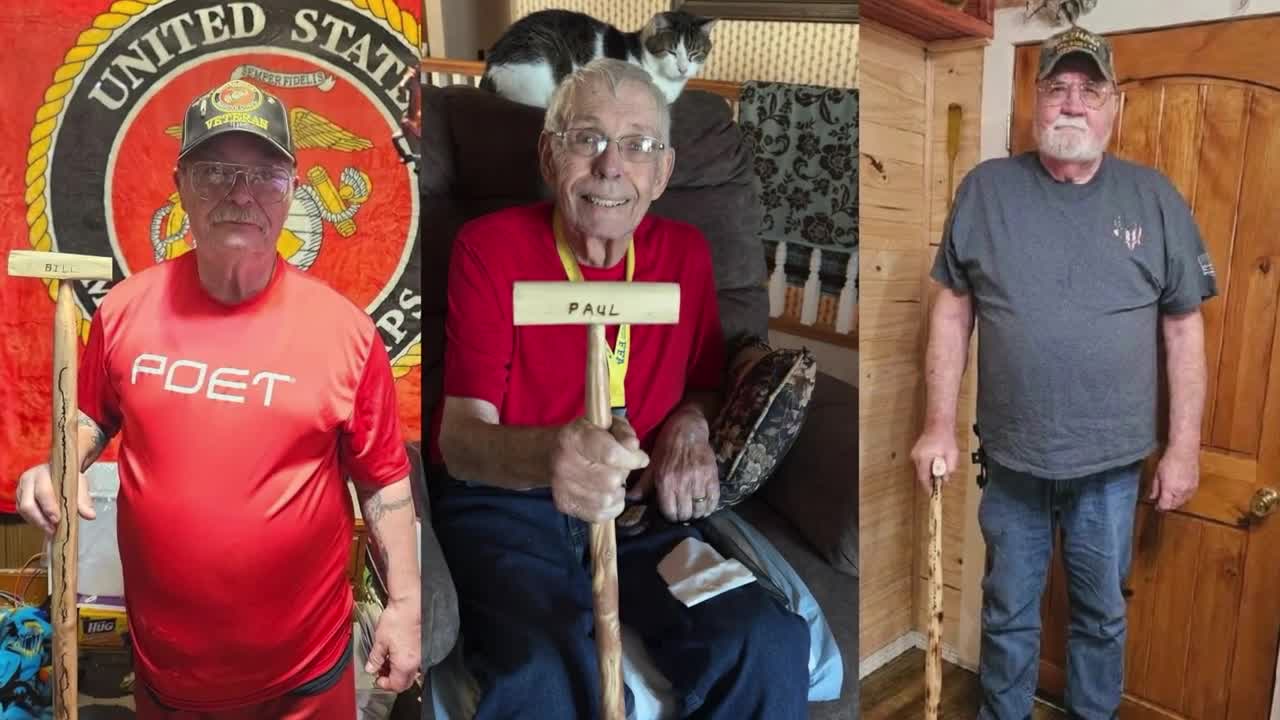NEBRASKA CITY, Neb. (KMTV) — Why is it important to thank our veterans?
Charlie White had a powerful answer to that, when 3 News Now's Mary Nelson visited him in Nebraska City for Positively the Heartland.
- "You want the truth?," White started. "Because I don't know how to speak Japanese or Russian. What language would we be speaking if it wasn't for those guys?"
- About five years ago, White decided - with his sawmill and access to scrap wood - he could make custom canes for the men and women who've served.
- Through Canes for Vets, White and other volunteers have produced roughly 700 canes so far at no cost.
Continue reading for the broadcast transcript of this story.
"My dad had served. And I knew from an early age that I was going to go into the military," Gary Rock explained.
Adding, he'd do it all again.
The same goes for Patrick Wheeler.
"We didn't raise our right hand to get thanked. We did it out of a sense of commitment and honor. But, we sure do appreciate it when people recognize it."
In words and deeds - like custom t-handle canes.
"Has my ship on it, my dates of service, my name, my branch of service," Wheeler described of his cane.
For Rock?
"Berlin, Germany, Korea, Afghanistan, Fort Carson, Colorado..." are engraved.
The places remind him of the people he served for and with.
"There's guys that I'm in touch with every day that I served 40 or 45 years ago in Germany with."
Rock has turned some of them on to Canes for Vets.
"With the canes, I feel like it's a conversation piece. Some of the older ones, they get forgotten about. And I've seen them receive their cane and they're so happy, it brings tears to their eyes," Lisa Hutchins, a volunteer, shared.
Each piece is ground, sanded and engraved from what would have otherwise been scrap.
"Charlie is one-of-a-kind," Hutchins laughed. "That's about what I can say about Charlie."
Charlie White.
He founded Canes for Vets five years ago.
"A friend of mine in Texas was doing it down there, and I thought, 'Dude, you ain't sh...,' pardon my French, 'But you ain't s**t compared to what I can do'," White chuckled.
He owns a sawmill, drives a semi, is a firefighter, and isn't fond of sleeves.
But, back to the canes.
White dedicates his nights and weekends to it, and brought in a handful of volunteers like Hutchins. Together, they've made about 700 canes.
"I never started keeping track right away. But here's their names. Their branch. Where they served at and what years," White said as he flipped through a three-ring binder.
White himself wasn't able to serve, but his gratitude for the people who did and do runs deep.
"Because I don't know how to speak Japanese or Russian. What language would we be speaking if it wasn't for those guys?"
Continuing, "If they lost the war, what would we be doing today? They would tell us what we're doing, instead of what we want to do."
A few organizations and business do have similar names. Click here to go directly to White's Nebraska City-based Canes for Vets.
While volunteers make each cane for free, there may be a cost to ship - as they've done to 13 states so far.




